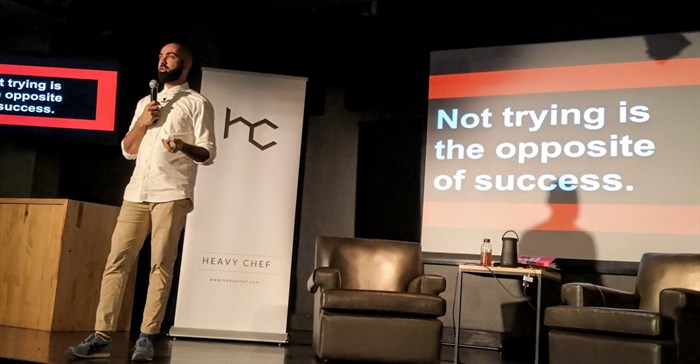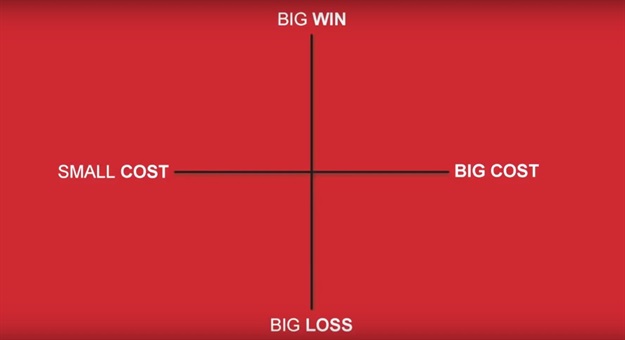
As we gathered at the Inner City Ideas Cartel in the heart of Cape Town CBD on a cool Monday morning mid-July, Roed kicked off the event telling us why this subject was close to his heart. He shared that he used to run a digital agency and before that he started a business (at the age of 25) which failed "spectacularly". It was his first business and he had to sell everything he had. He lost everything and landed in R1.3m of debt.
Roed joked that it was quite a while ago and that back then that was a lot of money. "It was a pretty harrowing experience but it really taught me a lot about what it meant to fail, and made me become quite philosophical. It actually gave me PTSD. I had to kind of recover through that, and fortunately, my next business did a lot better." He explained that Heavy Chef was a side business of the second business that he started and it grew into what they have today – something he started only one and a half years ago.
Roed said that he thinks in this country there is no better conversation to be had than failure. Even when you succeed, failure is along the way. It's inevitable.
The important thing, he says, is to shine a light on those experiences and really share the learnings from it so we don't have to view it as a red letter on us.'Mokusatsu'
He told us the story of how on a very cold, winters day in July, the year when he turned 18 and the day before his prelim exams, his parents walked into his room and proceeded to tell him that they were going to be getting divorced. It wasn't really unexpected but the first thing he thought was that he was going to fail his prelims... and he did.
Haralambous then moved on to another story that started back in 1945 in July during the Second World War when the major countries issued Japan an ultimatum. They said that if Japan did not respond favourably to this ultimatum, they would respond swiftly, promptly and with utter destruction. So the next day reporters asked then Japan prime minister, "What is your response to this?" and he responded with a word that he used many times before, and that word was "mokusatsu".
The word is actually meant to convey 'no comment', but there is no direct translation for that in English. That word is broken into two syllables, 'moku' and 'satsu', which mean 'silently to kill', so the media thought that he meant that he was disregarding the ultimatum with contempt. Ten days later, the bomb was dropped on Hiroshima.
"To kill with silence" #mokusatsu pic.twitter.com/zxH3vxh5QV
— Granger brain & Potter heart (@ibsandmabs) January 14, 2018
Haralambous said that what he wanted to convey with this story was that words really matter. He said there is one word in particular that he thinks we're getting wrong, and that word is 'failure'.
"Failure has been failing me for my entire life. I absolutely hate the word. When I say the word failure people always get this knot in their stomachs because failure generally promotes the thought of stopping, and I would like to change that up. I would like to provoke the thought that failure is not the opposite of success."
He went on to explain that he failed his first business in school when he was sixteen. He failed his learner's licence three times and subsequently his motorbike learner's licence 'umpteenth' times. He also failed a band that he was in, a nudge it, a gadget blog, and then he had two exits in the last 10 years.
"Mo Tribe was the business that was my first really big exit and I started at the end of Forefront Africa (Haralambous's other business) to understand that for me, failure wasn't the end of something, invariably, it was just a little period before I started the next thing. And this phrase, the title of my book, Do. Learn. Fail. Repeat. was like my life for me, and at the end of Mo Tribe, I felt that I failed and I thought, start again, and then I repeated," Haralambous explained.
There's a statistic (I wish I knew the source of) that states that American entrepreneurs generally quit after the third try. South African entrepreneurs usually quit after their first, and that's a big difference if you consider that it takes you an average of 3-5 years to run a business either into the ground or into success. That's 15 years versus three years, and that experience is vast. That is our fear of failure.Your failability index
This is how most of us operate. We have our fear massively outweighing our ambition and that prevents us from starting. We are at a no-start point when fear outweighs ambition. Because we think of all the things we can lose, and at the end of the failure, like most South Africans, once we've finished with our first failure, we go back to a normal job or to what we knew before.
"I think we need to go to a point where we flip that around. We need to get to a point where your fear is significantly lower than your ambition, and then you get what I like to call the start of your failability index."
It's important we figure out where on this index we sit because you don't have to sit at win everything or lose everything, and that takes us to the quadrants we need to start considering and looking at what we should be doing next...

He said he also thinks it's also important that we don't think of cost in terms of money. Yes, there is a monetary cost, but there's also your time. Like the time he put in to write his book. "I've spent my career jumping around these quadrants. I went from big losses and big wins to small losses and small wins. I lost millions of rands and gained millions of rands and lost it again, and that's just the nature of it. You have to get up and do it again."
So basically you have to figure out where you sit on this index. Unfortunately, most of us think that we are in the danger zone – in the bottom quadrant where we can only suffer big losses and big costs. But you can have little wins every day. You can be someone that starts a small business and builds it over five years so that the loss and uncertainty is mitigated.
This is what Haralambous calls his failability index or propensity to fail. For a framework of failability, you need to ask yourself some really simple questions:
1. Can I start right now?
For most people, if their fear outweighs their ambitions they never start. Just ask yourself if you can start right now in the most simple way.
2. What is the actual cost?
Is it time, is it money, is it time away from my family? What is the actual cost? Because often we explode that cost in our brains.
3. What will I lose?
If you invest your time over six months, one hour a week, do you actually lose if this doesn't work out? Most of the time we think that our ego will get damaged and people are going to think that we're stupid. So, we just don't do it.
4. What will I gain?
So, what will you look like after you fail? Will you lose your house? Will you live on the street? When you lose your job, will you not be able to get a new one?
5. Will this actually kill you?
He means this quite literally. If you start the business of your dreams, will you die? No, you probably won't. There are very few businesses you can start that will end up getting you killed. So, then why not start? If it's not going to kill you, you're not going to fail.
Haralambous recently discovered something called post-traumatic growth. There is a scientific study being done that looks at what people go through once they've experienced trauma, and failure is a trauma. "When I had a business sold behind my back, it felt like a loss. I experienced a trauma. I made money, but it was a loss for me. However, I learned that what doesn't kill you makes you stronger, and that couldn't be more appropriate when it comes down to failure. We all think about it like a cliche, but it's the truth. You're not dead so therefore you have to learn something, get back up and do it again.
"So for me, failure is not the opposite of success. Not trying is the opposite of success. If you don't even bother to give it another go, then you've already lost."
For more on Nic Haralambous or info on his book, visit his website or follow him on Twitter or Facebook. Follow Heavy Chef on Twitter, Facebook, YouTube and LinkedIn for any updates on events or visit their website for more info.
